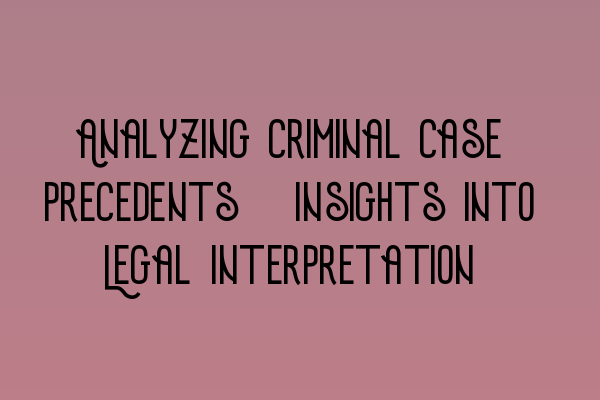Analyzing Criminal Case Precedents: Insights into Legal Interpretation
Legal interpretation is a fundamental aspect of criminal law practice in the UK. It involves analyzing and applying legal precedents to determine the outcome of a criminal case. Criminal case precedents provide valuable insights into how the law has been interpreted in the past, serving as a vital resource for lawyers, solicitors, and legal professionals.
Understanding Precedents in Criminal Law
Precedents are previous court decisions that have established legal principles and interpretations. They serve as legal authorities and are crucial in guiding the interpretation and application of the law. The principle of stare decisis, meaning “to stand by things decided,” ensures that lower courts are bound by the decisions of higher courts.
By analyzing criminal case precedents, legal professionals gain a deeper understanding of how the law has been interpreted in similar situations. This analysis allows them to draw parallels, identify key arguments, and make informed decisions about how to approach their own cases. It provides a roadmap for legal interpretation and helps ensure consistency and predictability in the application of the law.
Insights from Criminal Case Precedents
Criminal case precedents offer valuable insights into various aspects of legal interpretation. They shed light on the interpretation of statutes, rules of evidence, burden of proof, and other essential elements of criminal law. By examining the reasoning behind previous court decisions, legal professionals can develop persuasive arguments and strategies for their own cases.
One of the key benefits of analyzing criminal case precedents is the ability to anticipate and counter opposing arguments. By studying how courts have interpreted and applied the law in similar cases, lawyers can identify potential weaknesses in their opponents’ arguments and strengthen their own. They can leverage these precedents to support their legal positions and enhance their chances of success in court.
Importance of Legal Research
Effective legal research is crucial for analyzing criminal case precedents. It involves thorough examination of relevant case law, statutes, regulations, and legal commentary. Legal professionals must utilize comprehensive legal databases and resources to access a wide range of precedents and ensure their research is up to date and accurate.
Online platforms offering SQE 1 practice exam questions, such as SQE 1 Practice Exam Questions, can be useful tools for legal professionals. These platforms provide a simulated exam environment, allowing practitioners to test their knowledge and familiarize themselves with the types of questions they may encounter in the real SQE exam.
Continuing Professional Development
Continuing professional development (CPD) is essential for legal professionals. It enables them to stay updated with the latest legal developments, including new case law and changes in legislation. Participating in SQE 2 preparation courses, such as SQE 2 Preparation Courses, can help enhance legal professionals’ knowledge and skills, equipping them with the tools they need to excel in their careers.
Additionally, ongoing preparation for the SQE 1 exam is crucial. SQE 1 preparation courses, such as SQE 1 Preparation Courses, provide comprehensive study materials and guidance for aspiring solicitors. These courses cover essential topics, including legal skills, legal research, and legal writing, all of which are crucial for understanding criminal case precedents and improving legal interpretation skills.
Conclusion
Analyzing criminal case precedents is an integral part of legal interpretation in the UK. It provides valuable insights into how the law has been applied in previous cases and helps guide legal professionals in their own practice. By staying updated with the latest trends and developments in criminal law, solicitors and legal practitioners can improve their legal interpretation skills and enhance their chances of success in representing their clients.
For more information about SRA SQE exam dates, please visit the SRA SQE Exam Dates page.
